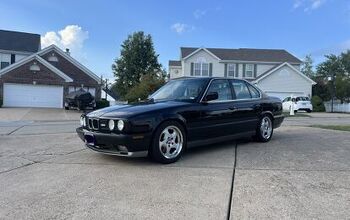Privacy? What Privacy? We Are Saving Lives Here!

It’s a nice idea: Each car is equipped with a wireless beacon, transmitting speed, direction and whatnot to other cars. For years, people have been dreaming about this. Now they could have found the killer app for the technology: By mashing up that information, collision courses could be plotted and lives could be saved. Exactly that was demonstrated yesterday to federal officials in Washington.
“In the demonstration in the parking lot near RFK Stadium,” reports the Washington Post, “the system notified a driver when it detected another car speeding through a red light in an upcoming intersection, of several cars blocking the highway ahead, and of a car zooming up from behind.”
The NHTSA wants to make that system mandatory by 2013. In order to work, it must be mandatory. A car without a beacon will not exist as far as this system is concerned. Even if mandatory in new cars, it would take 15 to 20 years until all cars on the road will jabber away in a huge chat room.
A report by the National Highway Traffic Safety Administration in October reported that such “vehicle-to-vehicle” warning systems could address nearly 80 percent of reported crashes that do not involve drunk drivers.
The trouble is: The majority of fatal accidents are single vehicle accidents. Of the 33,808 fatal accidents recorded in 2009 in NHTSA’s FARS database, 19,869 were single vehicle accidents, where this system would do absolutely nothing, unless each tree and lamp post is equipped with a beacon. Only 13,939 were multiple vehicle accidents.
So if we are supposed to remove DUI cases (why? Enabriated folk sure could use some beeps and blinks), then the system could “address” (not prevent) less than a third of the fatal accidents.
But then, a system that advertises speed and direction of a car would be any administrator’s dream. No more RADAR or red light cameras needed. GPS trackers in every car! Makes you want to get out and walk.

Bertel Schmitt comes back to journalism after taking a 35 year break in advertising and marketing. He ran and owned advertising agencies in Duesseldorf, Germany, and New York City. Volkswagen A.G. was Bertel's most important corporate account. Schmitt's advertising and marketing career touched many corners of the industry with a special focus on automotive products and services. Since 2004, he lives in Japan and China with his wife <a href="http://www.tomokoandbertel.com"> Tomoko </a>. Bertel Schmitt is a founding board member of the <a href="http://www.offshoresuperseries.com"> Offshore Super Series </a>, an American offshore powerboat racing organization. He is co-owner of the racing team Typhoon.
More by Bertel Schmitt
Latest Car Reviews
Read moreLatest Product Reviews
Read moreRecent Comments
- Ltcmgm78 Just what we need to do: add more EVs that require a charging station! We own a Volt. We charge at home. We bought the Volt off-lease. We're retired and can do all our daily errands without burning any gasoline. For us this works, but we no longer have a work commute.
- Michael S6 Given the choice between the Hornet R/T and the Alfa, I'd pick an Uber.
- Michael S6 Nissan seems to be doing well at the low end of the market with their small cars and cuv. Competitiveness evaporates as you move up to larger size cars and suvs.
- Cprescott As long as they infest their products with CVT's, there is no reason to buy their products. Nissan's execution of CVT's is lackluster on a good day - not dependable and bad in experience of use. The brand has become like Mitsubishi - will sell to anyone with a pulse to get financed.
- Lorenzo I'd like to believe, I want to believe, having had good FoMoCo vehicles - my aunt's old 1956 Fairlane, 1963 Falcon, 1968 Montego - but if Jim Farley is saying it, I can't believe it. It's been said that he goes with whatever the last person he talked to suggested. That's not the kind of guy you want running a $180 billion dollar company.


































Comments
Join the conversation
I predict there will be a cottage industry that arises to disable these things (if the NHTSA succeeds in requiring them to be installed in all new vehicles), at least in states that don't mandate yearly comprehensive vehicle inspections.
Why don't they tie in the drunk driver interlock also? Your system could light up and provide the BAC of all drivers around you, so you could see if someone had been drinking, even if they weren't over the limit? And how about a smoke detector, so that your system could tell you if someone is smoking pot in their car? Maybe the seats could be fitted with a sensor that could run a blood test to look for various drugs, and broadcast that to surrounding drivers? And how about tell you if there is a working cell phone in the car, since even if a passenger is using it, that is a distraction? And if there are kids in the back seat, since the driver may be distracted turning around to yell at the kids? The above may sound silly, but the NHTSA has publicly identified each of those issues as serious safety concerns. If they want to install a Big Brother system, then they are going to have to feed it all the above data. Or they are just being hypocritical about the above "safety" issues, and are just in it to increase their own power. You make the call.